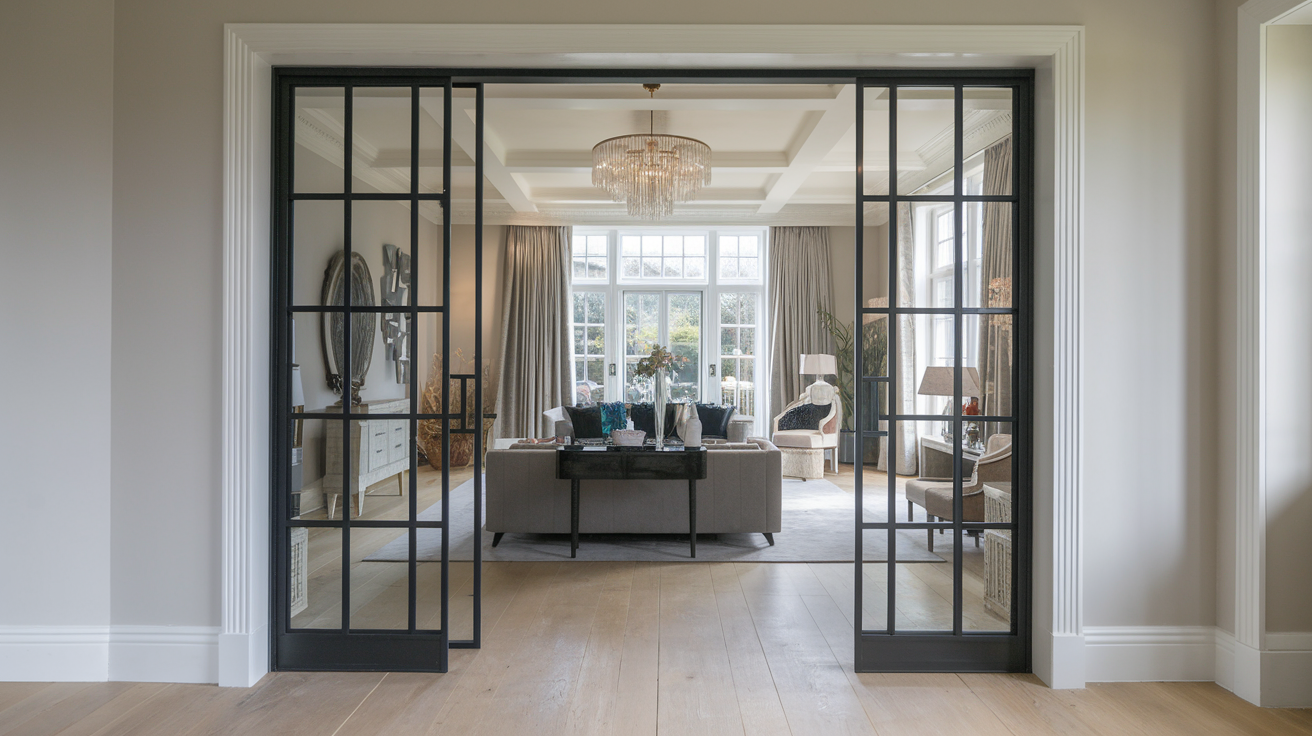How Effective Are Steel Doors for Soundproofing? A Comprehensive Guide
Steel doors are renowned for their durability, security, and fire resistance, but their effectiveness in soundproofing is often debated. Are steel doors inherently soundproof, or do they require specific enhancements to block noise effectively?

This in-depth blog unpacks the soundproofing capabilities of steel doors by examining their construction, acoustic properties, advantages, limitations, and practical applications.
Are Steel Doors Inherently Soundproof?
(Short answer) No, Steel doors offer a strong foundation for soundproofing due to their density and mass. However, they are not inherently soundproof and must be engineered with additional features to achieve optimal acoustic performance.
Factors such as the door's core material, sealing system, and installation method significantly influence its soundproofing capabilities.
The Fundamentals of Soundproofing
To evaluate the soundproofing potential of steel doors, it is essential to first understand how soundproofing works. Sound moves in waves and can travel through solid objects, cracks, or even tiny gaps. Effective soundproofing requires addressing three main factors: mass, density, and airtight sealing.
The Role of Mass and Density
Heavier and denser materials are better at blocking sound because they resist vibrations and prevent sound waves from traveling through them. Steel, being dense and heavy, naturally has an advantage in this regard. This property makes steel doors inherently more sound-resistant than lightweight alternatives such as hollow-core wood doors.

However, steel alone does not guarantee complete soundproofing. The design and core material of the door, along with proper sealing, play a critical role in determining its overall acoustic performance.
Airtight Sealing
Even the densest material can fail to block sound effectively if there are gaps or leaks. Airtight sealing around the perimeter of a door ensures that sound waves cannot travel through small openings. High-quality steel doors are often paired with advanced seals, acoustic gaskets, and threshold systems to create an airtight barrier against sound.
Sound Absorption
Sound absorption differs from sound blocking. Absorptive materials are used to reduce echoes and improve acoustics within a space. While steel doors primarily focus on blocking external noise, they can be paired with absorptive materials for enhanced performance in environments such as recording studios or home theaters.

Core Material: The Key to Acoustic Performance
The core material inside a steel door is a critical component for soundproofing. Here are some common core types and their acoustic properties:
- Honeycomb Core: Composed of lightweight steel or cardboard cells, this core offers structural support but is not ideal for soundproofing due to its open structure.
- Steel Stiffened Core: Contains vertical steel reinforcements, providing excellent durability but requiring additional soundproofing enhancements to block noise effectively.
- Mineral Core: A dense material specifically designed to absorb sound waves, making it one of the best choices for soundproof steel doors.
- Foam Core: Lightweight and energy-efficient, foam cores provide moderate soundproofing and are commonly used in residential settings.
Steel doors with high-quality cores, such as mineral or foam cores, can achieve superior soundproofing, with Sound Transmission Class (STC) ratings exceeding 50. For comparison, typical hollow-core wood doors have STC ratings of 20-25.

The Importance of Installation and Sealing
Proper installation and sealing are just as crucial as the door's construction. Even a high-performance steel door can fail to block sound effectively if it is not installed correctly. Soundproofing professionals often emphasize the following elements during installation:
- Acoustic Seals: These seals are placed around the door's edges to create an airtight barrier, preventing sound from escaping or entering through gaps.
- Automatic Door Bottoms: These devices drop a seal to the floor when the door is closed, effectively blocking noise from passing underneath.
- Soundproof Door Frames: Frames made from dense materials complement the door's soundproofing properties, ensuring no sound leakage at the junctions.
Attention to these details can dramatically improve the acoustic performance of a steel door, transforming it into a highly effective sound barrier.

Advantages of Steel Doors for Soundproofing
Steel doors with proper enhancements offer several advantages for soundproofing applications. Here are the key benefits:
Durability and Longevity
Steel doors are highly resistant to wear and tear, maintaining their structural integrity and soundproofing performance over time. Unlike wood, they do not warp, crack, or degrade, ensuring consistent acoustic properties for years.
High STC Ratings
Steel doors with soundproof cores can achieve STC ratings of 50 or higher, making them suitable for environments where noise control is essential. For context, professional recording studios typically require STC ratings of 50-60, while standard residential interior doors only reach 20-25.
Multi-Functionality
In addition to soundproofing, steel doors offer excellent fire resistance and security. These features make them a versatile choice for a variety of settings, from industrial facilities to high-end residential projects.
Aesthetic Customization
Modern steel doors are available in a wide range of finishes, colors, and designs. This allows them to blend seamlessly into different architectural styles while providing superior soundproofing.

Limitations of Steel Doors for Soundproofing
Despite their many advantages, steel doors have some limitations when it comes to soundproofing:
High Initial Cost
Steel doors with advanced soundproofing features can be expensive compared to traditional wood or hollow-core doors. While the long-term benefits often justify the cost, the initial investment may be prohibitive for some budgets.
Weight and Complexity
The density and mass of steel doors make them heavy, which can complicate installation. Reinforced door frames and heavy-duty hinges are often required to support the door's weight, adding to the overall cost and complexity.
Thermal Conductivity
Steel is an excellent conductor of heat, which can result in thermal bridging if not properly insulated. While this does not directly impact soundproofing, it may affect energy efficiency and comfort in certain applications.

Practical Applications of Soundproof Steel Doors
Steel doors with soundproofing enhancements are widely used in both residential and commercial settings. Below are some common applications:
Residential Settings
- Home Offices: Soundproof steel doors can block out external noise, creating a quiet workspace for increased productivity.
- Home Theaters: Enhancing the audio experience by preventing sound leakage and blocking external disturbances.
- Bedrooms: Providing privacy and a peaceful environment by reducing noise from common areas.
Commercial and Industrial Environments
- Recording Studios: Steel doors with high STC ratings are essential for professional-grade sound isolation.
- Conference Rooms: Ensuring privacy during meetings by preventing sound from traveling to adjacent spaces.
- Factories and Workshops: Reducing noise pollution from machinery to create a safer and more comfortable environment.

Public Buildings
Soundproof steel doors are also valuable in public spaces such as schools, hospitals, and auditoriums. They help maintain quiet environments and prevent noise disturbances in areas where concentration and comfort are critical.
Enhancing the Soundproofing of Steel Doors
For those seeking to improve the soundproofing of an existing steel door, several upgrades are available:
- Acoustic Panels: Attaching sound-absorbing panels to the door's surface can significantly enhance its ability to block noise.
- Upgraded Cores: Replacing the core material with a denser option can improve the door's STC rating.
- Improved Sealing Systems: Installing high-quality acoustic seals and door bottoms ensures an airtight barrier against sound.
- Double Door Systems: Using two steel doors with an air gap in between creates an additional layer of sound insulation, ideal for high-noise environments.

Conclusion
Are steel doors soundproof? The answer depends on their design, core material, sealing, and installation quality. While steel doors have inherent properties that make them excellent for blocking sound, achieving optimal soundproofing often requires specialized enhancements. When paired with the right features, steel doors can achieve impressive STC ratings, making them suitable for a wide range of applications.
Whether you need a quiet home office, a secure recording studio, or a noise-free industrial workspace, steel doors offer a durable and versatile solution. By understanding the factors that influence their soundproofing capabilities, you can make an informed decision and select a door that meets your specific needs.

